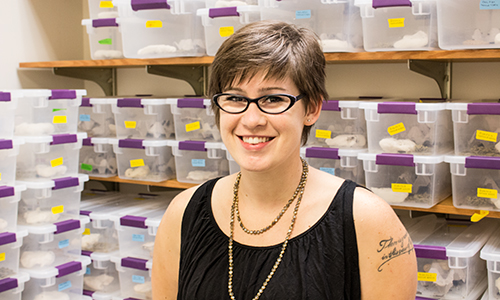
What made you decide to pursue a Master's in the U of M's EEB program?
My road to Minnesota was not totally typical: I started my graduate work at the University of California, Riverside, but my advisor moved after my first year, and I came with her. I'm thrilled that I did! There's a lot more overlap between my research interests (sexual selection, behavior, and evolution) and the interests of the people around me. For example, there's a behavior-themed seminar that meets on Fridays. It's really informal and fun, and it's one of the ways I've gotten to know the people around me and their research.
Tell us a little bit about your research.
I do research on how females change their mating behavior based on experience with males — either through their sexual signals (in this case, songs, since I study crickets) or actually mating with them. For example, if you keep female crickets in a silent environment, which should indicate that males are very rare, they get less choosy and respond more strongly to hearing male songs. I also take a modeling approach to study how these socially mediated behaviors influence the strength of selection.
I think the whole idea of sexual signals is so weird and cool. Sexual signals are commonly very costly. For example, male crickets' songs make them conspicuous, which exposes them to all sorts of predators. So why signal at all? Because females like it. Plus, I think insects are amazing. For animals that are small and appear to be uncomplicated (if you dissect male crickets, there's basically nothing in there but testes), they have surprisingly sophisticated structures for producing signals, perceiving/localizing them, and reacting to the information encoded in a seemingly adaptive way. Yay, insect sex!
For those not from Minnesota, what is a Minnesota winter like?
Cold and long, but sunny. To me, the biggest surprise about Minnesota winters is how distinctly different "cold" (20°F), "really cold" (10°F), and "really really cold" (0°F) feel. When it's "cold," your nose hairs freeze. "Really cold" makes your eyes feel really weird. "Really really cold" and the first intake of breath shocks you awake. I like winter, though! In winter, Minnesota looks like a totally different (and beautiful) planet. Oh, but practice driving on snow and ice!
For those who don't consider themselves "city people," does the University of Minnesota feel like an urban campus?
Yes, the U is an urban campus, in the sense that you can see evidence of being in the city all the time. But the Twin Cities have tons of parks, so some form of outdoor recreation is always readily accessible. In summer, people do a lot of lake-based activities (I'm putting in a plug for Lake Nokomis! It's a lot less visited than Lake Calhoun and it's very peaceful) and in winter, there's tons of gorgeous snowshoeing and cross-country skiing. Outside the Cities, Minnesota has unparalleled natural beauty. DEFINITELY go up to the Boundary Waters at least once while you're here.
Some graduate programs feel somewhat cutthroat. Is that the case with EEB?
No, in the sense that EEB students are friendly, social, and supportive rather than competitive. However, EEB's students are also very, very accomplished and can be intimidating without actually trying. I was in the first group of students who took the Graduate Foundations in Ecology, Evolution, and Behavior course, and I found it really helpful in terms of getting comfortable voicing my opinions even when I wasn't totally sure of myself.
Once you have your Master's, what are you going to do with your degree?
I'll be finishing my degree in the next few months, and I'm currently applying to data analyst and technical writer positions in industry in the Twin Cities.
Is the EEB program supportive of students interested in careers outside of academia?
The department is very supportive of students beginning non-research careers, but are better connected with the academic community (e.g., local teaching colleges and community colleges) and policy groups than with industry. Students wanting to go into a non-academic job still have resources within reach, though: CBS (the college that EEB is part of) has a career fair that lots of life sciences and environmental companies come to look specifically for life sciences students.